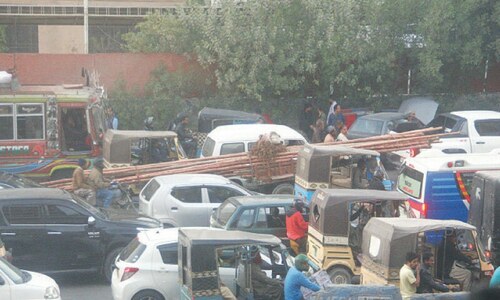KARACHI, July 11: Pakistan Tehrik-i-Insaf chairman Imran Khan has said that had there been protests against the army operation and atrocities in what was then East Pakistan, the country could have been spared the tragedy that befell it in 1971.
He claimed that he was on the last flight out of Dhaka before the Pakistan Army launched the operation and he overheard someone saying ‘Kill Bengalis: we will teach them a lesson.’
“While our own people left us, we are repeating similar mistakes in the tribal areas and Balochistan now,” said Mr Khan while speaking at the launch of a book ‘Escape from Oblivion: The Story of a Pakistani Prisoner of War in India’ authored by an ex-army officer and defence analyst, Ikram Sehgal, at a hotel on Wednesday evening.
The book is based on the notes of Mr Sehgal’s one-month-long debriefing on his return to the country after successfully fleeing the Panagarh war camp in India.
Other speakers at the programme, which started almost an hour behind the schedule and event organisers had to rearrange the agenda by requesting the guests to proceed for a tea break first, were Mr Sehgal himself, retired brigadier A.R. Siddiqui, retired brigadier Mohammad Taj, retired lieutenant general Ali Kuli Khan and former federal minister Javed Jabbar.
The PTI chief said that in 1971 when he was returning from Dhaka after playing an under-19 cricket match he decided that he would never back a military operation against the country’s civilians.
Then in the 1990s when his team of young first class cricketers beat the Indian team in a Dhaka stadium, it reverberated with the slogan ‘Pakistan Zindabad’ that lent strength to his views that Bengalis turned against West Pakistan due to our own mistakes, he added.
He told the gathering that drones attacks or use of gunship helicopters against militants in the tribal areas or Balochistan was creating extremism in the country as innocent lives, too, were being lost in the strikes. A delegation from Fata told him that in a recent drone attack in a tribal area, five people were killed and as villagers gathered to see the casualties they were hit by another strike. The government withheld this information and the security agencies did not allow locals to share these facts with journalists, he said.
Mr Khan said he was against military actions in civilian areas because they dehumanised the general public and turned locals into barbarians.
About the book, he said it reminded him of his eight days in jail where it was sheer boredom that he had to fight with, but the 99 days that the author spent in captivity must have been quite challenging. He said: “The book is absorbing and a real life thriller.”
On a lighter note, he wished the author best of luck for the business empire he had built over the years and asked him to make as much money as he could in the shortest possible time, because the PTI would fix the police department first when voted to power.
Earlier, Javed Jabbar said the 138-page book was as slim as Mr Sehgal used to be. “It is very direct, thrilling and gripping with unfolding adventures,” he said. He added that the book had four dimensions — the Pakistan Army’s role in defending the country; the world largest democracy’s plans to disintegrate Pakistan by running secret camps well before the war began despite the non-violence policy India used to boast of; the tragedy of the original Pakistan in terms of contradictions in the matter of identity; and the support of individuals, including Hindus, Sikhs, Muslims and Christians, who went out of their way to help the courageous prisoner of war.
Retired Lt-Gen Ali Kuli Khan spoke on the personal life of the author. He said Mr Sehgal’s father was a Punjabi and mother a Bengali. He went to St Lawrence College, Ghoragali. Then he was a runner up for the sword of honour in the PMA 34th long course. It was his love for the unit, 2-East Bengal (Junior Tigers), that his father had raised that he made him join it after being commissioned into the Pakistan Army in 1965.
Retired brigadier Mohammad Taj said that he tasked the then Capt Sehgal of looking after the company after six people had deserted it. It was his love and efforts for the unit that the company was named after him.
Speaking of Balochistan, he said Akbar Bugti was a patriot, and it was unfortunate that he was killed.
Author of Tragedy of Errors and East Pakistan: The Endgame — an Onlooker’s Journal, retired brigadier A.R. Siddiqui said that the people of East Pakistan were only asking for their due share and rightly so. But the majority party in West Pakistan did not want it.
And yet, he added, “one can’t condone the army for whatever was done. They were looking for East Pakistan to separate … and there were no protests.” Only a few lines of condemnation came from Wali Khan and a couple of other leaders, he recalled.
He said he was in ISPR when Col Gul Hasan told him to declare that the war had ended and he had to prepare a press release. He said he could not say no to it though it was not an easy task. He could not avoid writing the word ‘gloomy’ despite being advised to write ‘grim’ in the press release.
Mr Sehgal, who successfully escaped from a POW camp that remained undeclared by India throughout 1971, thanked the speakers and invited a former US marine, who had allowed him to enter the US consulate in Calcutta (now Kolkata) while on the run, to the stage to share his views with the audience.
Earlier, Ameena Saiyid of the OUP introduced the guest and presented a book to the chief guest Imran Khan, who arrived at the venue around one and a half hours late.















































Dear visitor, the comments section is undergoing an overhaul and will return soon.